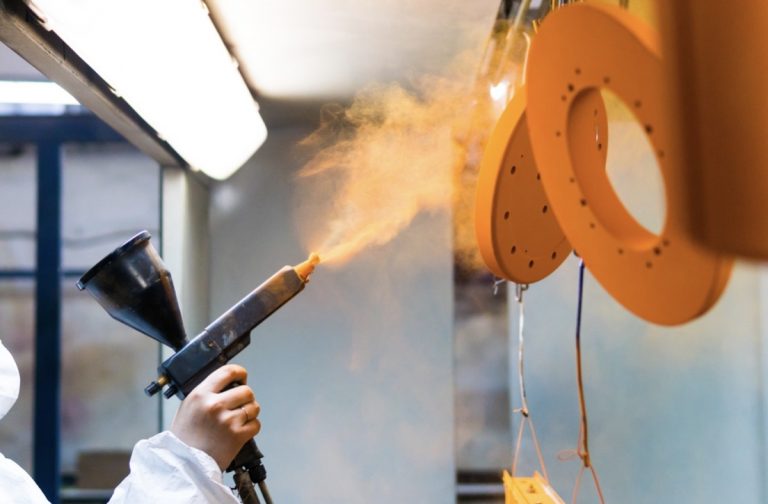The industrial coatings industry’s growing rapidly. It has a current value of over $81 billion and an estimated CAGR of around 3.0% between now and 2027.
This serves to highlight both the importance and popularity of industrial coating materials in the modern world. Are you interested to find out more about this topic and how industrial coatings might help you in your industry?
Keep reading to find out more about the available options.
Story Stages
Which Industries Rely on Industrial Coating Materials?
Industrial coating systems help improve the longevity and appearance of manufactured goods. They protect items from wear and tear, decay, and corrosion while adding a touch of color to the finished product.
You can use industrial coatings on almost every material used to create OEM products. These include plastics, wood, composites, rubber, leather, and metal.
They’re used in the preparation of several items we use every day, such as:
- Appliances
- Sports equipment
- Toys
- Building products
- Automobiles, planes, and boats
- Outdoor equipment
- Agricultural equipment
- Bicycles
- Security and safety equipment
A well-chosen industrial coating takes any product to the next level. So, what are the options when it comes to these protective materials?
Polyurethane Coatings
Manufacturers use polyurethane coatings across a broad range of applications. They work well as a protective coat for custom-formulated industrial primers.
Polyurethane coatings offer protection from wear and tear, damage, and abrasion. These types of coatings have an attractive high-gloss finish and maintain their color well. If you need added environmental and UV durability, you can opt for an Aliphatic polyurethane coating
Aromatic polyurethane coatings work best in wet conditions and even underwater. Unfortunately, these coatings sometimes fade when exposed to UV light. This makes them best for interior applications.
Epoxy Coatings
Epoxy coatings contain an epoxy polymer blended with an amine curing agent. The process is like mixing two tubes of epoxy glue to adhere materials together.
Due to these two components, manufacturers can create epoxy coatings with different characteristics. These custom solutions can meet the demands of a wide variety of environments.
These coatings bond well to a host of different surfaces. They resist abrasion and weathering and can withstand high temperatures.
You can apply epoxies in either two or three-part systems. Two-part systems involve applying a zinc primer as a base layer, followed by the epoxy coating. Three-part systems have an extra topcoat of polyurethane or another coating.
Polysiloxane Coating Systems
These industrial coating systems provide outstanding weather and abrasion resistance. They’ll also keep materials looking good-as-new for longer.
They do lack the flexibility and corrosion resistance required for industrial environments though.
When combined with epoxies to create epoxy polysiloxane coatings, all these problems disappear. This combination is the industry leader when it comes to UV, corrosion, weather, and chemical resistance.
This blend does cost more but it’s easy and quick to apply and provides long-lasting value.
The US Navy uses this hybrid coating on its vessels to maximize their lifecycle. It’s also used in a variety of other applications like:
- marine structures
- highway bridges
- storage tanks
- wastewater treatment plants
Fluoropolymer Coatings
Also known by the brand name, Teflon, this coating material’s well-known for its non-stick properties when applied to cookware and bakeware.
However, high quality Teflon coating services also offer the following benefits:
- Low friction
- Chemical resistance
- Heat resistance
- Corrosion resistance
For these reasons, fluoropolymer coatings work well for thermal coatings as well as for automobile parts.
There are also a few disadvantages to these coatings. They can deform slowly over time and may release noxious gases at excessively high temperatures.
Alkyd Coatings
An alkyd is a type of polyester with fatty acids and other components added to enhance flexibility. Alkyd coatings help manufactured products resist the effects of a variety of environments.
You can get customized formulations that work best in exterior, interior, underwater, and underground environments.
These coatings take longer to dry than other popular types of industrial coatings but applying heat can speed up the process. Alkyd coatings also offer low resistance to acids and alkaline.
Zinc-Rich Coatings
Zinc coatings contain high amounts of zinc dust. The idea is that the zinc adds galvanic protection to steel surfaces i.e. it corrodes instead of the steel beneath it. As the zinc corrodes, it forms a barrier between the environment and the steel.
There are two main types of zinc-rich coatings. These are:
- Organic zinc-rich coatings containing polyurethane or epoxy binders
- Inorganic zinc-rich coatings with silicate binders
These durable coatings are a durable, abrasive resistant solution for protecting steel products.
On the downside, you’ll often need to topcoat them, and you can only apply inorganic zinc-rich coatings to spotlessly clean surfaces. Both types of zinc-rich coatings don’t resist alkaline and acidic substances well.
Acrylic Coatings
Acrylic coatings dry quickly and have a high gloss finish. They work well as adhesion-promoting primers and require few ingredients. Most acrylic resins contain the following:
- acrylic acid
- methacrylic acid
- monomers like methyl methacrylate or butyl methacrylate
They’re great for resisting corrosion, chemicals, and fading.
They’re often used to treat metal roof sheets or low slope roofing systems before or after installation. Acrylic coatings are a cost-effective treatment for roofs. Yet you will need to reapply the coating from time to time.
You get acrylic formulations in several varieties including waterborne, radiation-curable, or solvent-borne formulas.
Modern Solutions for Today’s Times
Modern-day coating materials offer unmatched benefits for every industry. So, there’s no doubt that the industry’s bound to live up to the lofty expectations mentioned above.
Are you interested in more aspects of business and industry today? Explore our online magazine for more topics that might satisfy your curiosity.
